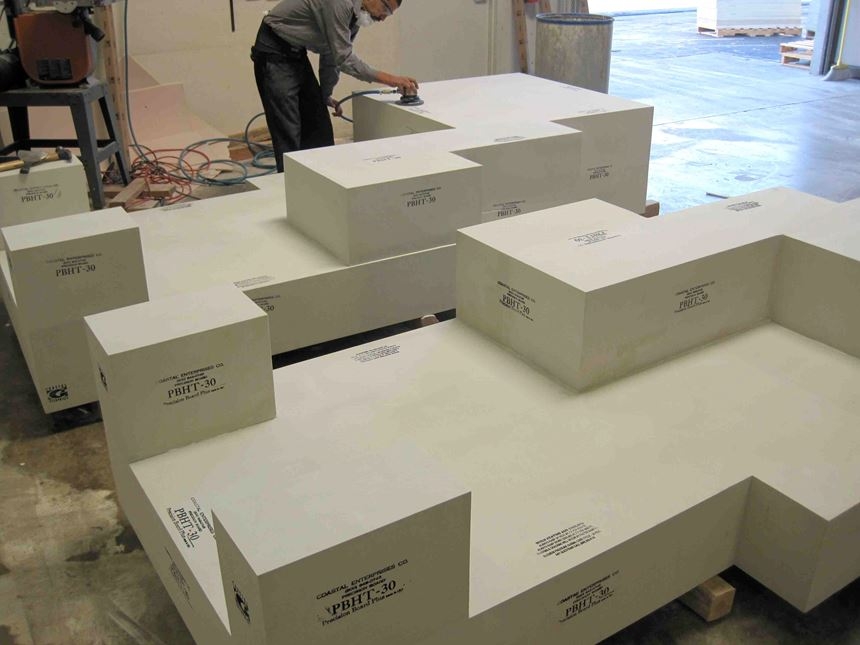National Composites Week is designed to introduce young people and others in the community to the composites industry, the career opportunities available, and demonstrate the contributions composites make to the local, national and global economy. Coastal Enterprises manufactures Precision Board, a high-density urethane tooling board used extensively in composites, including industries like aerospace, automotive and marine and in a variety of applications including molds and prototypes.
We’ll be sharing various ways that Coastal supports composites throughout the week.
Today’s Topic: What is soft tooling and how has it changed the composites industry?
Soft tooling (like Precision Board urethane) over hard tooling (metals like steel, aluminum and invar) has made a huge difference when it comes to short production runs and has given the industry greater flexibility when it comes to design changes and cost savings in terms of time and labor. The change from hard tooling to soft tooling was a long time coming, but it’s already made an impact on the composites industry and Coastal Enterprises has been there since the beginning.
The Transition from Hard Tooling to Soft Tooling
Formerly a composites engineer at Lockheed Martin Skunk Works (Palmdale, Calif.), Jon Sharp is a legendary air racer. While many of the projects Jon was involved in at Lockheed are still classified, he was heavily involved in the now-declassified Lockheed Martin/Boeing RQ-3 Darkstar UAV program. An early precursor to modern day UAV’s, Darkstar was designed as a high-altitude endurance UAV with stealth technology. This project, with Jon’s leadership and dedicated team, was the first time high density polyurethane was used for tooling on a government contract job, a pioneering move that allowed Sharp and his team to complete their project on time and on budget. It helped to pave the way for the large amount of high-density urethane tooling board seen today in the aerospace and composites industries.
Jon shared his thoughts on what it meant to switch from the time-consuming tooling methods they were accustomed to, to the lighter, more nimble high density urethane:
“90{afbea94bd31582343c3017644f03ec8d7d8fa2386ecb82c250661e06c0c6e111} of the tooling for Darkstar was made from 10lb and 20lb. HDU. It would have cost us roughly 30 times that amount to do the tooling with metal. Not only that, as soon as we discovered the numerous options we had for block configuration and sheet size, we never went back to bonding up railroad-tie size pieces of wood or buying chunks of metal like we did in the past,” he said.
“If you make the decision to buy metal tooling, you’re constrained by a lot of factors — higher cost, size and weight and overall lead time for the tool build,” says Coastal Enterprises president Chuck Miller. “High-density urethane foam offers much more flexibility and speed, and the coefficient of thermal expansion can be easily compensated for.”
Customization options, allowing for easier accommodation of design changes, also played a large role in high density polyurethane winning the hearts and minds of the aerospace tooling industry.
Sharp went on to say,
“Another major reason we were so drawn to HDU for tooling was the greater level of design flexibility that was suddenly available. We used to order our blocks several inches thicker than we needed them, which made the inevitable design changes much less of a headache. Could we have done that with metal? Absolutely not, we would have had to start all over again.” says Sharp. “The bottom line is, once high density urethane became available, we weren’t about to spend millions of dollars on tooling for a prototype, especially one that could be of limited life! The quality, consistency, and block configuration options of Precision Board cut labor time and cost down so drastically that we didn’t want to use anything else!”
The Benefits of Soft Tooling
To summarize, the advantages of using soft tooling are as follows:
- Shorter Machining Time
- Less Wear on Your Machine
- Lighter Weight
- Easily Accommodates Design Changes
- Lower Overall Project Cost
- Shorter Overall Tool Production Time
Additionally, Coastal Enterprises offers services you can’t get elsewhere. For instance, we can fabricate custom-bonded blocks and layup tool from Precision Board soft tooling, something that can’t be done with hard tooling. Our team can assemble complex step tools of any size, any thickness, and any density. Coastal’s bonded blocks have near imperceptible bond lines and are delivered in near-net shape, ready for machining immediately.
In tomorrow’s post we will address the many benefits of using Precision Board urethane tooling board from Coastal Enterprises and why many in the aerospace industry are relying more on soft tooling materials, like Precision Board.
National Composites Week Schedule
Monday- Coastal’s School Donation Program
Tuesday- What is soft tooling and how has it changed the composites industry?
Wednesday- The benefits of Precision Board over other tooling boards
Thursday- The creation and benefits of Precision Board step-tools
Friday- Coastal’s long history and roots in the space program
A group of composites industry leaders has announced the creation and launch of the inaugural National Composites Week, Aug. 26-30, 2019. The goal of National Composites Week is to encourage manufacturers from throughout the composites manufacturing supply chain — raw material suppliers, convertors, designers, toolmakers, fabricators, educators, students — to celebrate and bring attention to the myriad ways that composite materials and composites manufacturing contribute to the products and structures that shape the American manufacturing landscape today. More information is available HERE.
National Composites Week was organized and launched by braiding specialist A&P Technology, global advanced composites company Hexcel and media partner CompositesWorld magazine.
Coastal Enterprises manufactures Precision Board, a versatile, cost-effective and eco-friendly urethane material used extensively in the tooling industry. It is a closed-cell, rigid, dimensionally-stable substrate that is ideal for use in a number of different tooling applications.
Request free samples, get a quote or sign up for weekly e-blasts packed with helpful information.
